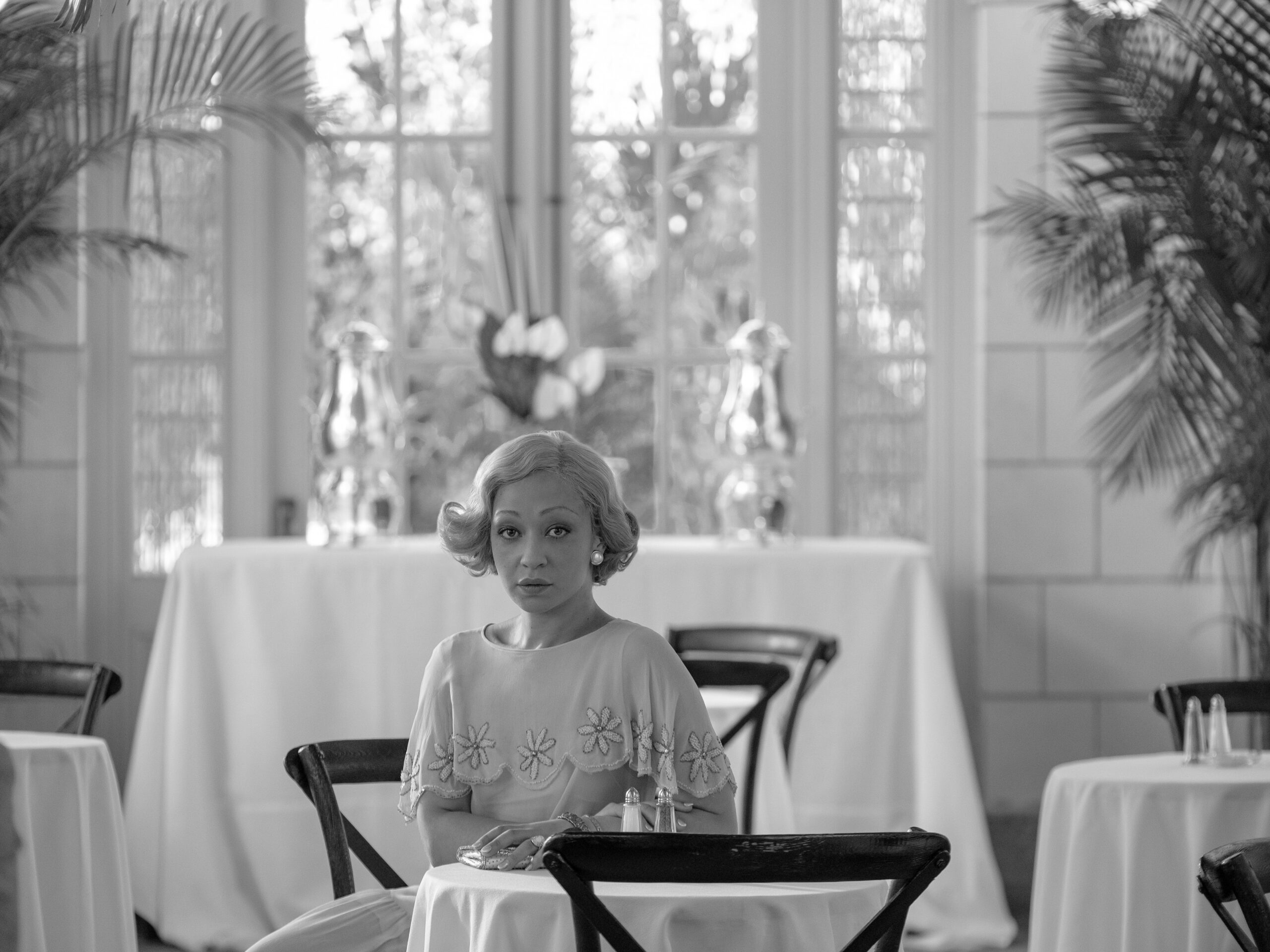
Adapting historic and seminal literature into film is no easy feat, the process of adaptation always requiring some divergence and malleability to bridge these two distinct artistic mediums. A filmmaker must make the story their own while also paying tribute to the original author, somehow transforming the written word, wrought with its own vicarious description and prose, into the visual world of cinema. Filmic translation tends to provide room for imperfection — and this is where the main issue with Rebecca Hall’s Passing, an adaptation of the 1929 Nella Larson novel of the same name, lies. But although the film can’t quite capture the source material’s juxtaposing narrative simplicity and thematic complexity, it is still, in a sense, very cinematic and visually exacting, making up for a less nuanced narrative with its technical prowess.
The plot follows a mixed-race woman named Irene Redfield, a housewife and mother of two who spends most of her days in her Harlem home and occasionally attends nightly social gatherings with her husband, Brian. After a chance encounter with her childhood friend Claire (who similarly is mixed-race, but “passes” for white), the two women become increasingly fascinated by and obsessed with each other. Claire is married to a pridefully yet ignorantly racist husband, John, and their relationship soon teeters on the verge of ending as Claire begins to embrace her African American heritage. She kept her familial and racial ancestry a secret and, now longing to reconnect with Irene, faces her secret being revealed. Irene is both scornful and empathetic of Claire, as well as haughtily curious and protective of her as they traverse their lives in 1920s Harlem.
While the narrative is not very intricate or convoluted, much of the script (written by Hall) is dedicated to the themes presented in Larson’s novel and how they manifest within racial and social spheres. That is, the ostensible gamut of scholarship around Larson’s book is utilized in some way in the film. The book and the film present themselves most obviously as texts on identity and racial passing, and how the existence of racial and gender norms can be both limiting and manipulated. But while both the novel and film further examine the intersections of gender and racial norms with class, sexuality, existential security, and parenting, Hall’s film is overall less nuanced and layered.
Particularly, the issue of homosexuality between Irene and Claire, which is more or less a point of speculation in scholarship, is abandoned in the film after its brief introduction. An ambiguity is created in the film around Irene’s relationship with Claire, whether it is substantiated through sexual attraction or through kinship and personal ties, but it is not given ample time to develop or influence the rest of the story. A good screenwriter should know when to diverge and what to expand on when adapting literature into film. Hall shows a restraint and preservation of the source material that ultimately limits her as a writer.
This thematic timidity led me to question if Hall was the appropriate choice for directing this project. She is far from lacking filmmaking experience and has a notable acting filmography, having collaborated with esteemed filmmakers like Christopher Nolan and Ron Howard. Passing is also a passion project for Hall, the development of the film inspired by a rumor that one of Hall’s ancestors may have been black and passed for white. Yet, is Passing too historically influenced and demanding for a person of her skill set and caliber? The answer is complicated by Hall’s surprising technical proficiency, bringing an exacting visual style and expertise for directing actors.
The monochrome cinematography by Eduard Grau is very beautiful and delicate, especially during the scenes in which Irene is reserved from her surroundings and passing as white herself. Two scenes in the first ten minutes or so immediately jump out to the viewer: Irene’s reserved cloche-hat-cloaked introduction in a toy store and her encounter with Claire in a restaurant. Hall and Grau capitalize on Thompson and Negga’s light skin complexions, using high contrast cinematography to emphasize the racial divide between white and black, and how Irene and Claire stray from the typical sociocultural binary. Racialized contrast becomes a visual motif throughout the rest of the film, reverberating in the production design, clothing, and lighting, all of it creating a sense of separation and disparity that perpetually embodies the racial divide of the early twentieth century. The diegetic piano score by Devonte Hynes should also be praised for its period ambiance, though the non-diegetic leitmotif of Tsegue-Maryam Guebrou’s “Homeless Wander” does become tiring.
The performances are also one of the stronger aspects of Passing, particularly those of Tessa Thompson and Ruth Negga. Thompson brings a subtle shyness and reservedness to Irene that is at times excellent, even if the accent occasionally enters cliched 1920s era New York territory. There is always a sense of interiority within Thompson’s performance, that despite the apparent satisfaction she may have in her life, there is still moral and existential affliction underneath. A scene towards the end, in which Irene looks up a staircase to see Brian and Claire giddily reaching the top, showcases an aptitude for subtlety. Thompson emotes a quiet expression of tiredness, disdain, and longing for Brian and Claire’s burgeoning relationship, a relationship marked by an exoticism and energy Irene remains an observer to. Negga is wonderfully flirtatious and haunted throughout as Claire, becoming a source of empathy and tragedy for the characters and audience alike. Despite her problematic situation, it is very easy to see why Claire would be adored by the people she meets and stir up jealousy and concern in Irene.
While adapting any seminal work of literature would be a monumental and demanding task for a novice filmmaker, Passing is a gorgeously functional, if somewhat unsatisfying, cinematic interpretation of Larson’s novel. While imperfect, there is still a lot for viewers to enjoy in Hall’s directorial debut.
Passing is currently streaming on Netflix.